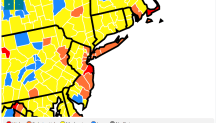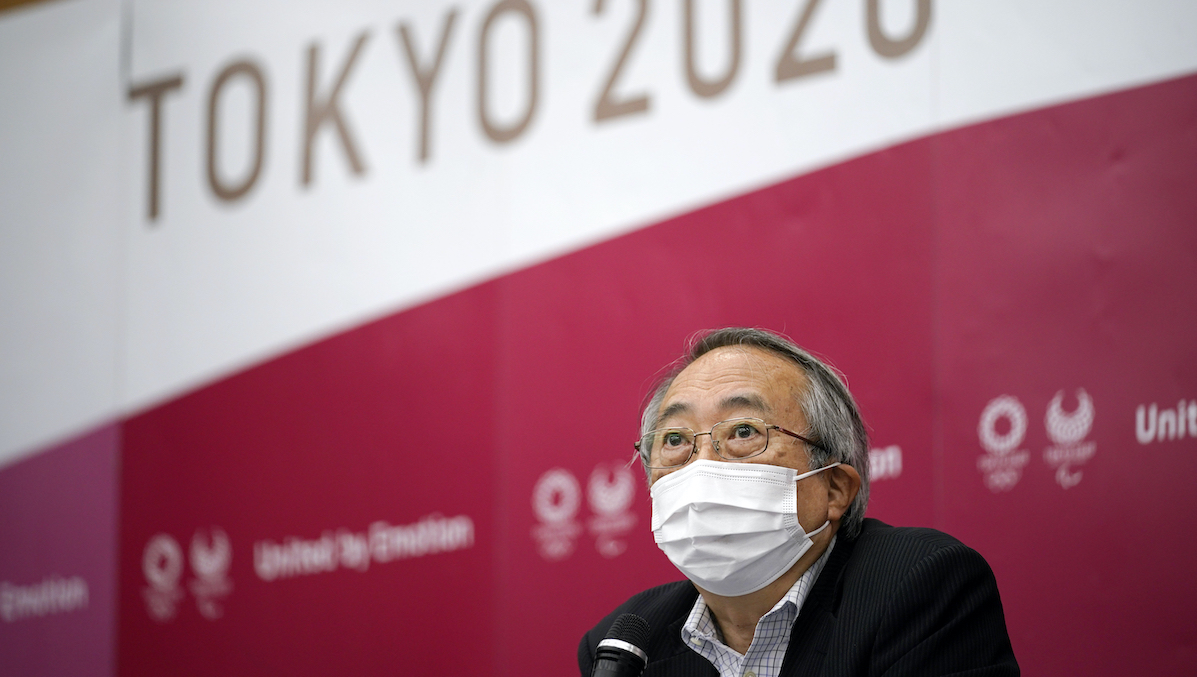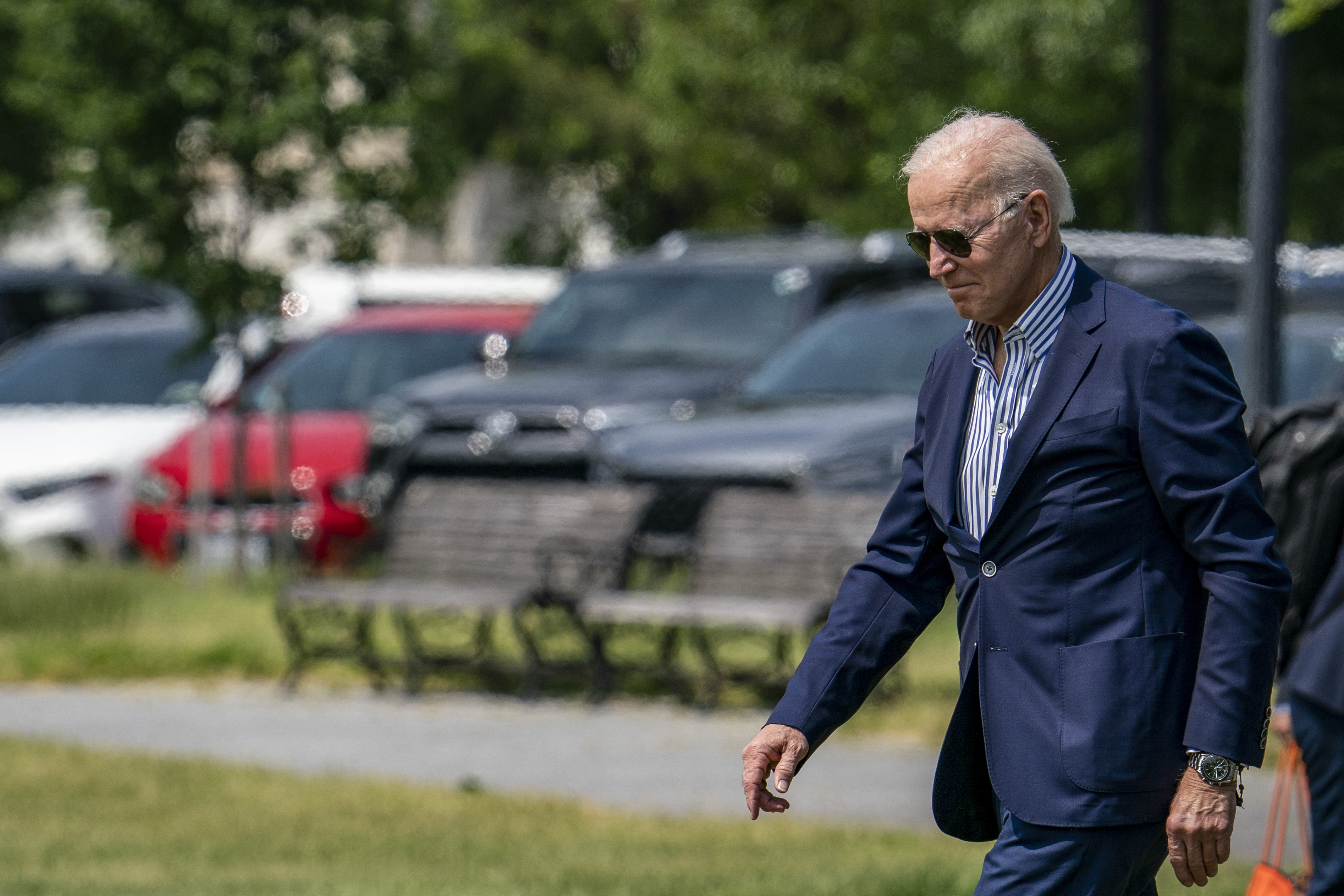What to Know
- The CDC released new indoor mask guidance for fully vaccinated people Tuesday as the delta variant fuels a surge in COVID cases across the U.S., especially in spots with low vaccinated rates
- Multiple cities and states have issued new vaccine-or-test mandates or reinstated mask rules amid the delta variant-driven case surge
- NYC has implemented a new vaccine-or-test mandate for all city workers, while the governor says his administration is reviewing the latest CDC recommendations with federal and state experts
The governors of New York and New Jersey on Wednesday publicly backed the idea of indoor masking for vaccinated people in high COVID risk areas, but stopped short of mandating it yet.
New York Gov. Andrew Cuomo says his administration is reviewing the CDC's new indoor face mask guidance for fully vaccinated people with federal and state health experts. It's not clear when the Democrat might make a final announcement as to those findings, but he has aligned with the federal agency on its previous mask recommendations.
On Wednesday, Cuomo told a business group the state was still reviewing the recommendation but that local governments in high COVID transmission rates should "seriously consider" adopting the new mask guidance.
The governor also said all New York state employees will face a Labor Day deadline to be vaccinated or face aggressive testing requirements. If they live in New York City, there's an extra incentive now -- Mayor Bill de Blasio said Wednesday anyone who gets their first dose at a city-run site starting Friday will get $100.
Get Tri-state area news delivered to your inbox.> Sign up for NBC New York's News Headlines newsletter.
But even as the delta variant rages, and Cuomo suggested cities consider new mask requirements, he also made a plea to businesses to do something he said would help stimulate the economic recovery -- open their offices again, even if it means requiring employees to be vaccinated.
"Private companies: Bring your employees back from remote work!" one of Cuomo's slides read during his presentation to the Association for a Better New York. He went on to suggest employers target Labor Day as a return-to-office timeframe. (Some of New York City's top office landlords are member of the group he was addressing.)
Moments after Cuomo spoke, New Jersey Gov. Phil Murphy took to Twitter to say he would "strongly recommend" vaccinated people wear masks indoors in high-risk settings. Those settings include crowded spaces, places with close contact with the unvaccinated or where the vaccine status of others isn't known, and places with immunocompromised people.
"Our metrics are trending in the wrong direction, and new data suggests the Delta variant is more transmissible even among vaccinated individuals, which is why we are making this strong recommendation," Murphy tweeted. "Fortunately, our numbers are a fraction of those in many other states, most of which have significantly lower vaccination rates. Should our numbers reach those levels, we reserve the right to take more drastic action, including a statewide mask mandate."
'Worrisome' Science on Delta
The stricter guidance come against the backdrop of new science on the delta variant of COVID-19. That science is "worrisome," CDC Director Rochelle Walensky said Tuesday as she issued the new mask guidance. Of particular concern, new evidence shows that in some cases, vaccinated people could become infected with delta and be as contagious as the unvaccinated, she said.
Walensky said the new recommendations mean even the fully vaccinated should wear masks in indoor settings in high and substantial transmission areas. They come amid an alarming delta variant-fueled case surge that has sent transmission rates soaring in parts of the country, particularly lower vaccination areas.
(This CDC map shows county-by-county transmission rates nationwide; the red and orange counties are the affected areas. As of 3:30 p.m. July 27, that included most of coastal New Jersey, New York and Long Island.)

The developments also affect schools, which the CDC says should still reopen, but with precautions.
"CDC recommends that everyone in K-12 schools wear a mask indoors," Walensky said.
The agency's director framed the new guidance as precautionary and said the best defense was still to be vaccinated. The change now, she said, was the new science that makes it clear the vaccinated with breakthrough infections can be contagious.
"I think we still largely are in a pandemic of the unvaccinated," Walensky said. "That said, if you have a vaccinated individual who is in place with substantial or high transmission, they're contacting a lot of people, 1 in 20, 1 in 10 of those contacts could potentially lead to a breakthrough."
The long-rumored development in the CDC's guidance comes after the Biden administration reviewed data suggesting fully vaccinated people are not only contracting COVID but might be carrying higher viral levels than previously thought, increasing the risk of infecting others, the sources said.
Immunized people are thought to still represent a fraction of new transmission -- and for weeks, the overwhelming majority of new hospitalizations, deaths and severe cases have been among individuals who have yet to get inoculated.
According to the sources, those facts prompted an internal debate among leading health officials: Should they recommend a uniform return to indoor masking? Should they suggest additional or renewed suggestions? Or merely inform?
The nation's leading infectious disease doctor took more of a warning approach over the weekend, perhaps planting the seeds for Tuesday's developments. Dr. Anthony Fauci said that the United States was heading in the "wrong direction" on the pandemic and that recommending vaccinated people wear masks inside was "under active consideration’’ by the government’s leading public health officials.
Delta Variant Fuels Case Surge Across NYC, US
Multiple cities and states have issued new vaccine-or-test mandates or reinstated mask rules in recent weeks amid the delta variant-driven case surge, including two of the former epicenters -- California and New York.
Health officials say the variant makes up about seven in 10 new cases in New York City -- it is by far the dominant COVID strain in the five boroughs and nationwide. Meanwhile, the number of vaccine doses being administered daily in the city has dropped to less than 18,000, down from more than 100,000 in early April.
New York City Mayor Bill de Blasio announced Monday that every city employee will have to either be vaccinated against COVID-19 or get tested weekly starting in mid-September. He described that a day later as "positive pressure" to get vaccinated.
It expanded his policy announcement a week ago that workers in New York City-run hospitals and health clinics must either get vaccinated or get tested weekly as the highly contagious delta variant fuels alarming increases in daily cases.
More on Delta Variant
“I want to emphasize that that either-or really creates a positive pressure for vaccination because it will be the responsibility of the employee to get tested on a regular basis, and that comes with its own challenges,” de Blasio said on MSNBC's “Morning Joe.”
Officials in California announced a similar mandate for state employees.
Unions representing some New York City employees pushed back on Monday's announcement that their members would have to either provide proof of vaccination or get tested weekly.
"The city and the mayor cannot simply disregard the civil liberties of the workforce,” FDNY EMS Local 2507 President Oren Barzilay said.
De Blasio said the city has a right to impose the new rule, which should motivate employees to schedule their shots.
“Just get vaccinated,” de Blasio said Tuesday. “Get it done, be safe, help your colleagues be safe, don’t have to go through the hassle of weekly testing.”
Unvaccinated workers will have until Sept. 13 to complete their vaccine series or opt for a virus test each week. But before that deadline kicks in, the mayor said unvaccinated workers must wear a mask at work starting Aug. 2.
The new vaccine mandate begins with city employees who work in congregate settings. That group, roughly 45,000 workers, will have to start testing weekly if they have not received their dose of the vaccine by Aug. 16.
The city plans to launch a new app to track COVID testing results. Set to launch for both iPhones and Androids, the app will hold testing results for up to seven days (meeting the city's new weekly mandate) before expiring. All data lives on an individual's phone and is not delivered anywhere else, city officials explained.
Because the app is available publicly in app stores, it's also up for grabs to other groups in New York City. The mayor said any local employers or venues can use the app for employees or patrons.
Did the CDC 'Flip-Flop?' Expert Opinions Very
For much of the pandemic, the CDC advised Americans to wear masks outdoors if they were within 6 feet of one another.
Then in April, as vaccination rates rose sharply, the agency eased its guidelines on the wearing of masks outdoors, saying that fully vaccinated Americans no longer needed to cover their faces unless they were in a big crowd of strangers. In May, the guidance was eased further for fully vaccinated people, allowing them to stop wearing masks outdoors in crowds and in most indoor settings.
The guidance still called for wearing masks in crowded indoor settings, like buses, planes, hospitals, prisons and homeless shelters, but it cleared the way for reopening workplaces and other venues.
Subsequent CDC guidance said fully vaccinated people no longer needed to wear masks at summer camps or at schools, either.
For months COVID cases, deaths and hospitalizations were falling steadily, but those trends began to change at the beginning of the summer as a mutated and more transmissible version of the coronavirus, the delta variant, began to spread widely, especially in areas with lower vaccination rates.
White House press secretary Jen Psaki said the delta variant has changed the nation’s COVID-19 outlook since the the CDC relaxed masking recommendations.
“That is their job. Their job is to look at evolving information, evolving data, an evolving historic pandemic and provide guidance to the American public,” Psaki said.
“What has not changed,” she added, “is the fact that people who are vaccinated have a huge deal of protection from serious illness, from hospitalization and from death.”
Some public health experts said they thought the earlier CDC decision was based on good science, which indicated that the risk of vaccinated people spreading the virus was relatively low and that the risk of them catching the virus and becoming extremely ill was even lower.
But those experts were also critical, noting that there was no call for Americans to document their vaccination status, which created an honor system. Unvaccinated people who did not want to wear masks in the first place saw it as an opportunity to do what they wanted, they said.
“If all the unvaccinated people were responsible and wore mask indoors, we would not be seeing this surge,” said Dr. Ali Khan, a former CDC disease investigator who now is dean of the University of Nebraska’s College of Public Health.
Lawrence Gostin, a public health law professor at Georgetown University, drew a similar conclusion.
“It was completely foreseeable that when they (the CDC) made their announcement, masking would no longer be the norm, and that’s exactly what’s happened,” Gostin said.
The CDC may be seen as “flip-flopping,” he said, because there’s been no widely recognized change in the science, he said. Furthermore, it’s not likely to change the behavior of the people who most need to wear masks.
“I don’t think you can effectively walk that back,” he said.
Ken Thigpen, a retired respiratory therapist who now works for a medical device manufacturer, is fully vaccinated and stopped wearing his mask in public after the CDC changed its guidance in May. But he started to reconsider in the last week after his job took him to hospitals in Mississippi, Louisiana, Alabama and Florida, where he witnessed medical centers getting inundated with COVID-19 patients.
“That delta variant is intense. It is so transmissible that we have to do something to tamp it down,” he said.
“I loved it when I could call the hospitals and they said, ‘We actually closed our COVID ward today or we are down to two COVID patients,’" he recalled. "And now we are opening the wards back up, and the numbers are going nuts.”



